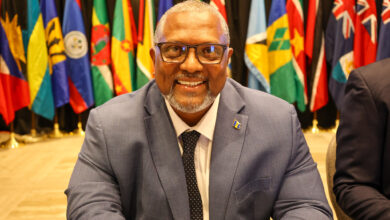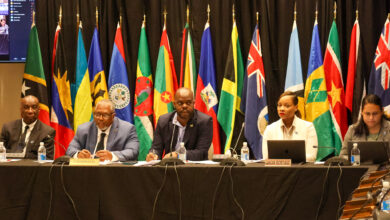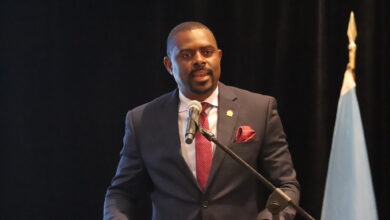(CARICOM Secretariat, Turkeyen, Greater Georgetown, Guyana) The Caribbean media has been charged to consider its modus operandi even as policy makers recognise its potency as an agent for change in reducing stigma and discrimination associated with HIV/AIDS.
Speakers at the at the formal opening of PANCAP’s three-day Champions for Change III : Conference to Accelerate the Media’s Role in reducing HIV and AIDS Stigma and Discrimination on December 7 acknowledged the regional media’s importance in the fight against HIV/AIDS but stressed it needed to do more to influence behaviour change.
Chair of PANCAP, St. Kitts and Nevis Prime Minister, the Hon. Dr. Denzil Douglas said that the media’s response to the devastating disease needed to go beyond simply understanding advocacy programmes. The media, he said, had the power to make a difference and needed to embrace its role to bring about behaviour change by writing persuasively on the disease and by exploring new forms of advocacy with emphasis on prevention.
Minister of State in the Office of the Prime Minister of Barbados The Hon. Joseph J.S. Atherley, who was the keynote speaker at the event at the Savannah Hotel in Barbados, said that the media needed to examine its own role in nurturing appetites that influence risky behaviour, and instead, promote desirable attitudes to ensure stigma and discrimination were things of the past.
Pointing to the impediment to the future prospects of the Region’s small states that HIV/AIDS represents, the minister said the disease flew stoutly in the face of regional aspirations for development.
“I think we need to recognise that when it comes to the business of risky behaviour, the media needs [to examine] the role it performs, perhaps unintentionally, in triggering the appetite that leads to that risky behaviour,” he told the audience that comprised journalists, media owners, policymakers, religious leaders, persons living with HIV/AIDS (PLWHAS) and representatives of entities involved in the fight against the disease.
With specific reference to advertising, the minister said the media must consider its civic and social responsibility versus its corporate agenda. In the fight against stigma and discrimination, the minister also stressed the need for partnerships to be forged between public and private media entities and between the media and corporate citizens.
There should also be shared philosophies that stem from shared values, common protocols on editorial policy and standard assurances throughout the regional media.
Minister Atherley also challenged the media to assist in crafting the development agenda of the Region through the process of “shared lobbying”. That shared voice must address legislative provisions with regard to insurance for PLWHAs and their treatment at the hands of professional among other pertinent issues.
In the interlude between remarks by Department for International Development, Caribbean (DFID) Head of Division, Ms. Sandra Pepera and Minister Atherley’s speech, Ms. Beverley Reynolds poignantly sang “Please don’t walk away from me now that I’m living with HIV.’”
Other speakers on the programme were Chairman of the Barbados National AIDS Commission and Chair of the Board of the Global Fund to fight AIDS, Tuberculosis and Malaria, Dr. Carol Jacobs and Chair of the Caribbean Broadcasting Media Partnership on HIV and AIDS, Dr. Allyson Leacock.
A technical meeting of experts at the Savannah Hotel preceded the formal opening.
The first Champions for Change Conference, which targeted a general audience, was held in St. Kitts and Nevis in November 2004. The second was held in Guyana in November 2005 and focused on faith-based organizations.
Pan Caribbean Partnership on HIV/AIDS (PANCAP), a UNAIDS Best Practice – established on February 14, 2001 in Barbados – is a 70-member Caribbean partnership that encompasses all the stakeholders. It is coordinated by the CARICOM Secretariat and is a coordinating agency that supports programmes and initiatives on HIV/AIDS. It also mobilizes resources to support those programmes and initiatives.





